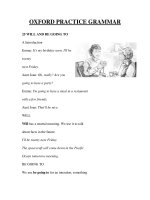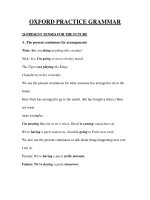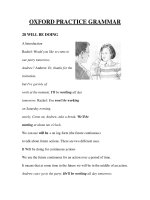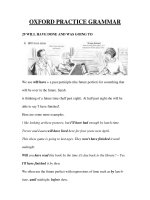Tài liệu OXFORD PRACTICE GRAMMAR 75 pptx
Bạn đang xem bản rút gọn của tài liệu. Xem và tải ngay bản đầy đủ của tài liệu tại đây (240.87 KB, 6 trang )
OXFORD PRACTICE GRAMMAR
75 SOME STRUCTURES WITH THE ING-FORM
A Two actions at the same time
All afternoon Claire lay in a hammock reading a magazine.
When two things are happening at the same time, we can use a main verb
(lay) and an ing-form (reading).
Here are some more examples.
We had to stand in a queue waiting for the bank to open.
You can t sit watching television all day. All afternoon, Vicky lay on the sofa
thinking about life.
We can also use this structure when one action comes in the middle of
another. We use the ing-form for the
longer action.
Matthew injured his knee doing gymnastics. (= He injured his knee while he
was doing gymnastics.)
I went to sleep listening to the radio.
B One action after another
When there are two short actions, one straight after the other, we can use an
ing-form for the first action.
Opening the bottle, Mike poured the drinks. (= He opened the bottle and
then poured the drinks.)
Turning right into Madison Avenue, the car drove north for two blocks.
We can also use the perfect ing-form.
Having opened the bottle, Mike poured the drinks. (= After opening the
bottle, Mike poured the drinks.)
If either of the actions is long, we must use the perfect.
Having photocopied all the papers, Sarah put them back in the file.
Having repaired the car, Tom took it out for a road test. NOT
Repairing the car, Tom took it-out for a road test.
These patterns are typical of written English. In spoken English, to talk
about one action after another we use
a sentence like this.
Tom repaired the car and then took it out for a road test.
C The ing-form saying why
We can use the ing-form to give a reason.
The fans queued for hours, hoping to get tickets. (= They queued
for hours because they hoped to get tickets.) Being the youngest
child, Natasha was her father's favourite. Not knowing the way, I
had to ask for directions.
We can also use the perfect ing-form to give a reason.
Having spent all his money, Daniel couldn't afford a new jacket. We
decided not to travel, having heard the terrible weather forecast.
75 EXERCISES
1 One action in the middle of another (A)
Say what accidents these people had. Use these phrases: lift weights, light a
fire, open a tin, run, ski
Put the verbs describing the longer action in the -ing form.
► Harriet burnt her hand lighting a fire.
1 Matthew ………………………………………….. 3 Vicky
.........…………………………………….
2 David ……………………………………………….. 4 Trevor
…………………………………………
2 One action after another (B)
Rewrite the sentences about a detective. Begin with an ing-form, e.g. doing
or having done.
Mitchell picked up the phone and dialled a number. He let it ring for five
long minutes and then slowly
replaced the receiver. He took a gun out of the drawer and put it in his
briefcase. He left the office and then
had to wait a while for the lift. He reached the ground floor and hurried
outside to a taxi. The taxi driver
pulled out a gun and shot Mitchell.
? Picking up the phone, Mitchell dialled a number.
? Having let it ring for five long minutes, he slowly replaced the receiver.
1
...........................................................................................................................
................................
2
………………………………………………………………………………
………………………………………………………………………………
…………………………………………..
3
………………………………………………………………………………
………………………………..
4
………………………………………………………………………………
………………………………………………………………………………
……………………………………………
3 The ing-form saying why (C)
Match the two parts and join them using an ing-form, e.g. doing or having
done.
? Because she didn't want to be late, Harriet turned on the heating.
? As she had worked hard all day, Andrew took it back to the library.
1 Because he had studied the map, Daniel found it hard to communicate.
2 She felt cold, so Vicky ran to the bus stop.
3 Because he didn't know French, Trevor knew which way to go.
4 He had finished the book, so Sarah was exhausted.
? Not wanting to be late, Vicky ran to the bus stop.
? Having worked hard all day, Sarah was exhausted.









